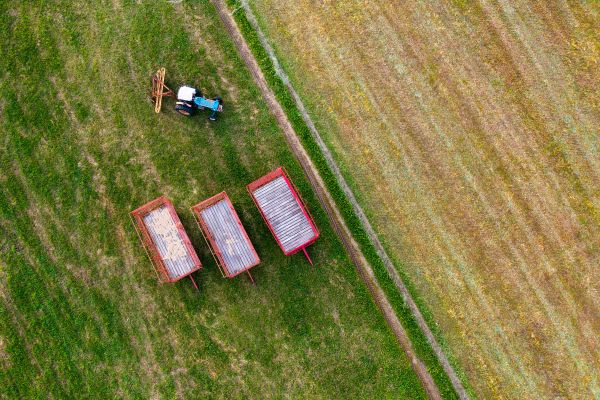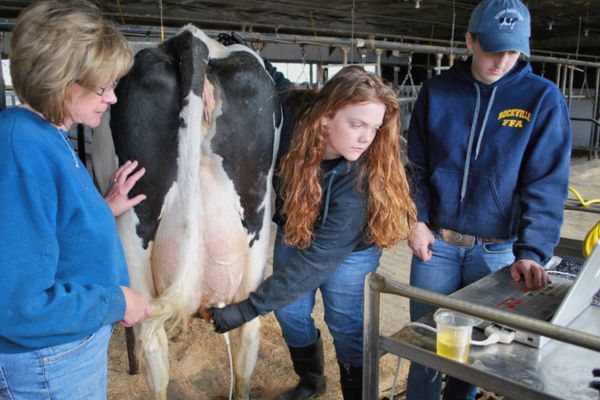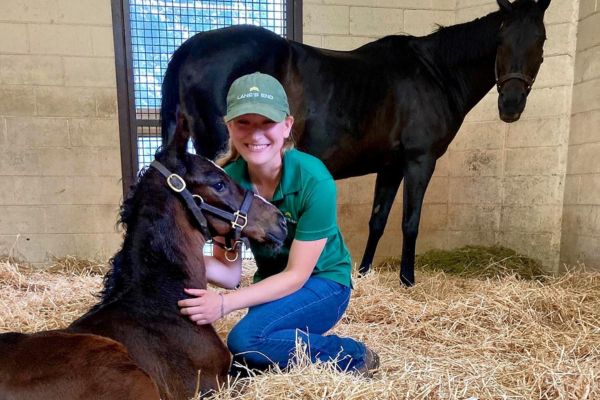Animal Science BS
Dairy Production
Area of Interest
Overview
The Dairy Production area of interest is designed to to provide students with a solid foundation in animal biology, nutrition, genetics, behavior and management, preparing students for employment in a variety of careers centered within the animal agriculture industry. The sequence of courses is structured to enable students to develop knowledge and skills in animal husbandry, food animal production, applied and resource economics, and business management and marketing.
Requirements
Animal Science majors must pass all courses from Group A, at least one course from Group B, at least one course from Group C, and one additional course from either Group B or C. No single class can satisfy more than one requirement.
Every undergraduate student in a baccalaureate degree program in the University, on all campuses, must complete the Common Curriculum. The Common Curriculum requires students to complete six Topics of Inquiry and three Competencies. All students must complete a minimum of 40 credits of coursework approved for the Common Curriculum.
Students must meet a set of requirements established by the college in addition to the University's Common Curriculum requirements. For more information, see the College of Agriculture, Health and Natural Resources section of the Undergraduate Student Catalog.
Sample Four-Year Plan
This is an example schedule for planning purposes only and is meant to be a guide for students and advisors. 120 credits total needed to complete degree. For official degree information, please contact the Degree Audit section of the Office of the Registrar and speak with your advisor.
- ANSC 1001: Introduction to Animal Science (3 Credits) — The biological, physical, and social factors that influence animal production and utilization.
- BIOL 1107: Principles of Biology I (4 Credits) — Designed to provide a foundation for more advanced courses in Biology and related sciences. Topics covered include molecular and cell biology, animal anatomy and physiology. Lab exercises include dissection of preserved animals. CA 3-LAB.
- Information Literacy (4 Credits): To satisfy the Information Literacy requirement, students must pass at least one of the following: ENGL 1007 (Seminar and Studio Writing and Multimodal Composition), ENGL 1010 (Seminar in Academic Writing), ENGL 1011 (Seminar in Writing through Literature).
- UNIV 1810: Animal Science Learning Community (1 Credit) — A course designed to assist students in adjusting to the University of Connecticut and to improve academic performance. Students will be exposed to UConn resources and facilities, enhance their academic and interpersonal skills, and learn strategies for problem solving and time management.
- Common Curriculum Course (3 Credits)
- ANSC 1111: Principles of Animal Nutrition and Feeding (3 Credits) — Digestive anatomy of various species and the classes of nutrients including their digestion, metabolism and sources. Nutrient requirements and feeding standards for livestock, companion animals, exotics and aquatics for purposes of reproduction, lactation, growth, work and maintenance. Classes of feedstuffs, their characteristics, proper utilization, formulating rations and nutritional programs for animal enterprise. Taught with SAAS 113.
- BIOL 1108: Principles of Biology II (4 Credits) — Designed to provide a foundation for more advanced courses in biology and related sciences. Topics covered include evolution and population genetics, plant physiology and diversity, animal diversity and behavior, and ecology. CA 3-LAB.
- Common Curriculum OR CHEM OR MATH OR STAT Course (3-4 Credits)
- Common Curriculum OR CHEM OR MATH OR STAT Course (3-4 Credits)
- Common Curriculum Course (3 Credits)
- PATH 2100: Anatomy and Physiology of Animals (4 Credits) — A study of the anatomy and physiology of animals with reference to pathological changes of the component parts of the body.
- ANSC 3121: Principles of Animal Genetics (3 Credits) — Principles of Mendelian and molecular genetics. Biosynthesis and function of DNA, RNA, and protein. This course also includes introductions to population and quantitative genetics. Information on molecular methods of genetic analysis and examples of genetics in animals of agricultural significance are also provided.
- CHEM OR MATH OR STAT Course (3-4 Credits)
- Group B/C ANSC Elective Course (3-4 Credits)
- Common Curriculum Course (3 Credits)
- ANSC 3122: Reproductive Physiology (4 Credits) — A study of the reproductive anatomy and physiology of domestic animals. Laboratory will include macro and micro anatomy, hormone action, and techniques used in reproductive management of domestic animals.
- ANSC 3194: Career Paths in Animal Science (1 Credit) — A discussion of current employment opportunities in animal sciences. In addition, students will prepare resumes and make oral presentations.
- CHEM OR Group B/C ANSC Elective Course (3-4 Credits)
- CHEM OR Group B/C ANSC Elective Course (3-4 Credits)
- Common Curriculum Course (3 Credits)
- Group B/C ANSC Elective Course (3-4 Credits)
- Group B/C ANSC Elective Course (3-4 Credits)
- CHEM Course (3 Credits)
- Common Curriculum Course (3 Credits)
- Common Curriculum OR Elective Course (3 Credits)
- ANSC W* OR Elective Course (1-3 Credits)
- Group B/C ANSC Elective (3-4 Credits)
- Group B/C ANSC Elective (3-4 Credits)
- 2000-Level Related OR Elective Course (3 Credits)
- 2000-Level Related OR Elective Course (3 Credits)
*W course must be taken with the corresponding C course.
- ANSC W* OR Elective Course (1-3 Credits)
- Group B/C ANSC Elective (3-4 Credits)
- Group B/C ANSC Elective (3-4 Credits)
- 2000-Level Related OR Elective Course (3 Credits)
- 2000-Level Related OR Elective Course (3 Credits)
*W course must be taken with the corresponding C course.
- ANSC 1602: Behavior and Training of Domestic Animals
- Credits: 3
- Offered: Spring
- Prerequisites: ANSC 1001
- ANSC 2271: Principles of Poultry Science
- Credits: 3
- Group: B
- Offered: Spring
- ANSC 3261: Dairy Cattle Management
- Credits: 3
- Group: B
- Offered: Fall
- ANSC 3273: Livestock Management
- Credits: 4
- Group: B
- Offered: Fall
- ANSC 3313: Growth Biology & Metabolism in Domestic Animals
- Credits: 3
- Group: C
- Offered: Fall
- Prerequisites: PATH 2100
- ANSC 3343: Animal Food Products
- Credits: 3
- Group: C
- Offered: Fall
- ANSC 4311: Advanced Animal Nutrition
- Credits: 3
- Group: C
- Offered: Fall
- Prerequisites: ANSC 1111
- ARE 1150: Principles of Applied and Resource Economics
- Credits: 3
- Offered: Fall, Spring
- ARE 2215: Business Management
- Credits: 3
- Offered: Fall, Spring
- ECON 1201: Principles of Microeconomics
- Credits: 3
- Offered: Fall, Spring
- ECON 1202: Principles of Macroeconomics
- Credits: 3
- Offered: Fall, Spring
- PATH 2301: Health and Disease Management of Animals
- Credits: 3
- Offered: Spring
- Prerequisites: PATH 2100


